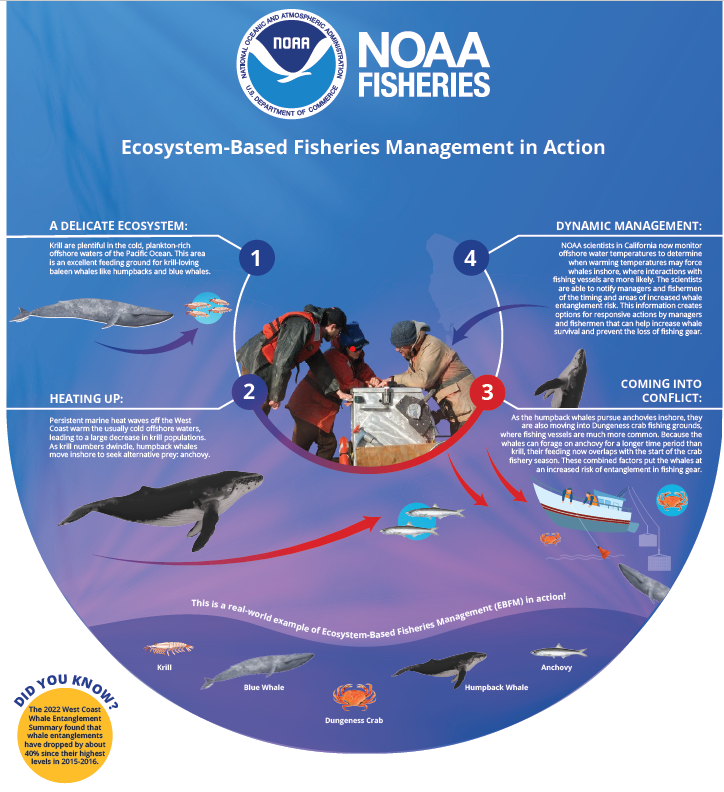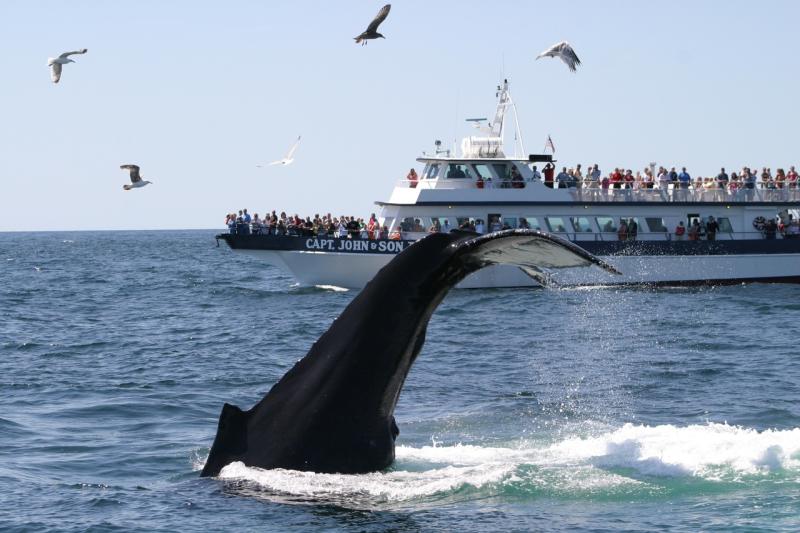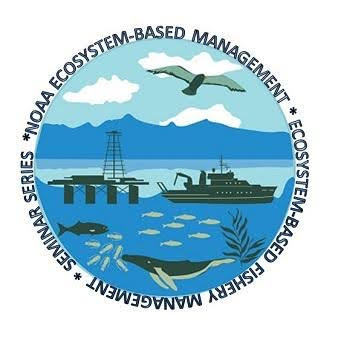Ecosystems
Ecosystems
Coastal and marine ecosystems involve complex interactions between organisms, their environment, and human activities. Ecosystem components interact through dynamic chemical, physical, and biological processes that influence organism populations and ecosystem sustainability.
NOAA Fisheries stewards healthy and resilient coastal and marine ecosystems that provide valued resources to our nation through ecosystem-based fisheries management.
What Is Ecosystem-Based Fisheries Management?
Ecosystem-based fisheries management (EBFM) is a systematic approach to fisheries management in a geographically specific area that:
- Contributes to the resilience and sustainability of the ecosystem over time
- Recognizes the physical, biological, economic, and social interactions among the affected fishery-related components of the ecosystem, including people
- Seeks to optimize benefits among a diverse set of societal goals
- Addresses challenges associated with a changing climate
Ecosystem-based fisheries management takes the most current climate, ocean, fisheries, and human dimensions science into account to move beyond the conventional single-species management approach. Climate change is impacting our marine resources in many ways, including by altering species distributions and productivity. EBFM is the umbrella approach for addressing these challenges.
Moving Beyond Single-Species Management

The single-species approach to managing fisheries and other marine resources focuses on observing each species individually within a narrow perspective. This limited lens provides information only relevant to that species and looks at only a few variables affecting the stock.
NOAA Fisheries manages numerous species in U.S. waters. To better understand how these species interact with each other, their habitats, and human activities, we must take a more comprehensive approach to understanding our species and ecosystems. This will ensure the long-term sustainability of these vital marine resources. Ecosystem-based fisheries management considers multiple interactions between living and nonliving components of the ecosystem, and considers compromises and tradeoffs between management decisions to identify a best outcome.

Ecosystem-Based Fisheries Management in Action
Managing multiple species based on current scientific knowledge requires a broad, dynamic approach that considers numerous variables while balancing the delicate nature of these marine habitats. How do you value commercial fisheries’ catch and livelihoods against the fondness many Americans have for beloved marine creatures?
Other real world applications of NOAA Fisheries’ ecosystem-based fisheries management
Evolving Management of Our Nation's Fisheries
The history of ecosystem-based fisheries management stretches back to the establishment of U.S. fisheries stewardship in the late 19th century. Ecosystem-based fisheries management has evolved to become part of NOAA’s mission. It helps us and our regional fishery management councils, fishery management organizations, states, tribes, and indigenous community partners meet sustainable fishery management goals. It also helps us prepare for the challenges of climate change while addressing multiple mandates.
The Road to Ecosystem-Based Fisheries Management
In 2016, NOAA Fisheries released its first Ecosystem-Based Fisheries Management Policy and Road Map to formalize and guide implementation of ecosystem-based fisheries management. These documents were updated in 2024 (PDF, 11 pages) to guide ecosystem-based fisheries management of the future. The policy was updated to:
- Clarify the links between EBFM and other NOAA Fisheries policies, guidance documents, efforts, programs and initiatives, including efforts that address the need for climate-ready fisheries
- Articulate the management aspect of EBFM and the need to approach EBFM as an adaptive process where science and management will always need to be updated, improved, iterated, et cetera for better integration of its science and management programs
- Integrate the socio-economic, habitat, climate change, ecological, ocean-use, and ocean condition information and needs throughout all EBFM Guidelines, particularly clarifying the need for climate-ready fisheries
Regional Marine Ecosystems
The physical boundaries of regional ecosystems are based on four ecological criteria:
- Bathymetry
- Hydrography
- Productivity
- Trophic relationships
Based on these criteria, there are seven distinct regional marine ecosystems around the United States:
- Alaska
- California Current
- Caribbean
- Gulf of America (formerly Gulf of Mexico)
- Northeast U.S. Shelf
- Pacific Islands
- Southeast U.S. Shelf
Each region’s fisheries are managed to meet their specific ecological characteristics and needs. The needs of each region result in their different approaches towards achieving ecosystem-based fisheries management and supporting climate-ready fisheries, habitat, and species.
Marine Ecosystem Science
We support nationwide ecosystem-based fisheries management through the research of various ecosystem and climate science programs. NOAA’s ecosystem science programs aim to holistically understand our ecosystems, as well as current and future challenges. The goal of these programs is to understand and provide advice on the important structures, functions, processes, and natural and human interactions that shape marine ecosystems and the services they provide.
Each program and region has a unique approach to understanding the complexities within our ecosystems. We synthesize their results into products that are used by decision makers in moving towards ecosystem-based fisheries management.
7 football fields per hour
Human activities, such as development, are a primary cause for coastal wetland loss. Studies have found that this loss is substantial—about seven football fields per hour! Wetlands filter waters that drain into the ocean, reduce the damaging effects of hurricanes and storms on our coastal communities, help our shorelines adapt to climate change, and play an important role in the productivity of commercial and recreational fisheries.
3 levels of ecosystem management
We work to maintain ecosystems in a healthy, productive, and resilient condition so they can provide the services humans want and need. Fishery managers and scientists frequently reference three levels of ecosystem management in relation to marine fisheries: ecosystem based management, ecosystem based fisheries management, and ecosystem approach to fisheries management.
5,000 known species of phytoplankton
Phytoplankton are the foundation of the marine food web. They feed lots of other marine life, from microscopic organisms to huge whales. By studying the more than 5,000 species of phytoplankton, we are able to evaluate ecosystem health and learn about any changes in these ecosystems.
8 distinct regional ecosystems
The physical boundaries of regional ecosystems are based on four ecological criteria: bathymetry, hydrography, productivity, and trophic relationships. Based on these criteria, there are eight distinct regional ecosystems around the coastal margins of United States.
Ecosystem-Based Fisheries Management
We are working to adopt an ecosystem-based approach for managing sustainable fisheries. Fishing is only one variable that affects a species' population. Interactions with other species, environmental changes, pollution, and other stresses on habitat and water quality can affect fish populations. To more effectively assess the health of any given fishery and to determine the best way to maintain it, fishery managers should take ecosystem considerations into account.
Integrated Ecosystem Assessments
We use integrated ecosystem assessments as a science-based decision-support process that provides the analytical framework to implement ecosystem-based approaches to manage our marine resources, including fisheries and protected resources. Integrated ecosystem assessments synthesize data on physical, chemical, ecological, and human processes within ecosystems to provide the sound interdisciplinary ecosystem-based science, trade-off evaluation, and management advice required to ensure our nation’s marine resources are sustainable and deliver a broad spectrum of benefits and services.
Understanding Ecosystem-Based Fisheries Management
Ecosystem-based fisheries management is a holistic approach that recognizes all the interactions within an ecosystem rather than considering a single species or issue in isolation.

Evolving Management
Ecosystem-based fisheries management is rooted in a strong tradition of stewardship and has continuously evolved over time to follow the most up-to-date science.
History of Ecosystem-Based Fisheries Management
Fishing communities, scientists, and managers have always understood that fish stocks are affected by the ecosystem and the species around them. Even though management is largely addressed on a single-species basis, NOAA Fisheries adopted ecosystem-based fisheries management within its mission to guide the agency and its partners–regional fishery management councils, states, tribes, indigenous communities, and organizations–to meet sustainable fishery management goals under multiple responsibilities.
Strategies for Today

With continued implementation of an Ecosystem-Based Fisheries Management Policy (PDF, 11 pages), NOAA Fisheries aims to:
- Promote understanding of the full range of the effects of human activities and natural processes on ecosystems, and the trade-offs across competing priorities and human uses
- Understand the impacts of management decisions on coastal communities and share that information with the public
- Effectively plan for and respond to challenges associated with a changing climate
- More efficiently and effectively fulfill NOAA’s mandates
Recovering, conserving, managing, and protecting native species within their habitats is a core tenet of ecosystem-based fisheries management. In turn, restoring and conserving these habitats is essential to the immediate short-term support of depleted populations and the long-term health of humans and other organisms. The Ecosystem-Based Fisheries Management Policy (PDF, 11 pages) provides an overarching set of guidelines for implementing ecosystem-based fisheries management under multiple responsibilities.
The Ecosystem-Based Fisheries Management Road Map describes how NOAA Fisheries’ science and management programs implement ecosystem-based fisheries management. Collaborating with communities, governments, and stakeholders helps us to better understand current vulnerabilities and future challenges for managing these ecosystems and species. Implementing Ecosystem-Based Fisheries Management means taking all of these interactions and trade-offs into account.
Strategic Planning Initiatives
There are many strategic planning initiatives related to ecosystem-based fisheries management, such as fishery ecosystem plans. Many councils use these as strategic planning documents that describe and integrate ecosystem goals, objectives, and priorities across multiple fisheries. Some councils use them to plan for the effects of various pressures on fisheries within an ecosystem.
Other examples of strategic planning initiatives include:
- The East Coast Climate Change Scenario Planning Initiative, which took place from 2021–2023. This initiative identified potential actions that NOAA Fisheries and the fishery management councils can take to prepare for potential future scenarios and conditions. Learn more about scenario planning.
- Regional fishery management councils' strategic actions to respond to climate change.
- The Ecosystem-Based Fisheries Management Road Map Implementation Plan (2018–2022) (PDF, 28 pages) for Atlantic Highly Migratory Species.
Ecosystem Science
Our ecosystem science programs and initiatives aim to understand and generate robust scientific information by holistically observing and evaluating our ecosystems. This information is vital for resources managers to make informed decisions about our ecosystems and the challenges facing them now and into the future.

These programs provide the best available scientific insights to managers by presenting their results on the following key components:
- Observations, mapping, monitoring, and data management: collecting, analyzing, and reporting information about marine resources, ecosystems, and social and economic conditions
- Research and modeling: Testing hypotheses about ecosystem structure and function; integrating a broad array of data; and investigating management scenarios
- Synthesis and evaluation: Providing scientific advice using relevant data about an ecosystem and its status with respect to specified management objectives
Decision makers and the public use products generated by these programs to implement ecosystem-based fisheries management.
Ecosystem Science Programs
Various programs apply the guiding principles of ecosystem-based fisheries management to our science activities:
- Integrated Ecosystem Assessment: For more than a decade, Integrated Ecosystem Assessments have been NOAA’s go-to approach for ecosystem-based management. This cross-NOAA program integrates all components of an ecosystem, including humans, into the science and decision-making process. This helps resource managers balance trade-offs and achieve their desired goals.
- Changing, Ecosystems, and Fisheries Initiative: A cross-NOAA effort to build a nationwide, operational ocean modeling and decision support system.

Tools and Methods
NOAA uses many tools and methods to implement ecosystem-based fisheries management. These are ever-evolving based on the latest scientific advice.
Ecosystem-based Management Seminar Series
In 2017, NOAA Fisheries launched a monthly seminar series in partnership with the NOAA Library. This series aims to increase awareness of ecosystem-based management. Speakers discuss the progress that NOAA and our partners are making to implement and enhance ecosystem-based management strategies so we can better understand marine ecosystems and provide decision support tools.
Tools and Methods
NOAA synthesizes and translates the ecosystem science that it conducts into formats that are useful for resource managers and the general public. NOAA Fisheries and regional fishery management councils are using these tools and others to address cross fishery management measures, including climate change.

Climate Vulnerability Assessments
Climate vulnerability assessments identify which species and habitats may be most vulnerable based on their exposure to projected changes in the environment (such as warming oceans) and their sensitivity or adaptability to handle those changes based on their life history characteristics (e.g., reproductive rates, diet etc).
Distribution Mapping and Analysis Portal (DisMAP)
DisMAP is a national web application which displays spatial distribution data for over 400 marine fish and macroinvertebrates. The portal provides visualization and analysis tools to better track, understand, and respond to shifting distributions of marine species due to changing environmental conditions.
Ecosystem Status Reports
Ecosystem status reports are a compilation and synthesis of ecosystem indicators that are relevant to marine resource management. These reports are presented to fishery management councils on an annual basis in some regions, and are used for non-fishery ecosystem applications at national, regional, and state levels. Ecosystem and socioeconomic profiles are being developed to provide ecosystem indicators at the scale of a specific fish stock.
Ecosystem Modeling
Ecosystem modeling is used to better understand our ecosystems. These models range from qualitative conceptual models co-developed with stakeholders to quantitative models used to evaluate potential tradeoffs between management options for ocean uses. Periodic workshops are held to help establish standards for ecosystem models.
Ecosystem Risk Assessment
Ecosystem risk assessment tools are used to analyze relative risk broadly or in response to a small number of drivers. They provide a framework for integrating large amounts of ecosystem information in a standardized, yet flexible and transparent way to help identify issues to prioritize in science or management.
Essential Fish Habitat Mapper
NOAA Fisheries maintains an essential fish habitat mapping tool to assist with habitat consultations. Essential fish habitat includes habitats or substrates important to managed species for feeding, breeding, spawning, or growth to maturity.
Human Dimensions and Social Sciences
Taking human dimensions and social sciences into account is a critical component of effective fisheries management. The Human Integrated Ecosystem Based Fishery Management, Research Strategy 2021–2025 was created to spur interdisciplinary marine resource management that balances conservation, preservation, industry profitability, food production, jobs, and human wellbeing.
NOAA Fisheries’ socio-economic indicators application displays a suite of 14 statistically robust social, economic, and climate change indicators that uniquely characterize and evaluate U.S. communities’ vulnerability and resilience to disturbances.
Management Strategy Evaluation
Management strategy evaluations are structured analytical tools that use simulation to assess the potential trade-offs that arise in addressing different ocean resource management priorities.
National Marine Ecosystem Status
NOAA’s National Marine Ecosystem Status site provides snapshots of major marine and Great Lakes ecosystem indicators. It provides information about the status and trends of eight U.S. ecosystem regions, as well as an overall national status. The site also directs users to more detailed sources of NOAA data and information.
Scenario Planning
Scenario planning is a method of identifying uncertainties and determining options that will meet management goals across multiple possible sets of future conditions.
Regional Ecosystems
Regional Marine Ecosystems

NOAA recognizes seven regional marine ecosystems around the coastal margins of the United States:
- Alaska
- California Current
- Caribbean
- Gulf of America (formerly Gulf of Mexico)
- Northeast U.S. Shelf
- Pacific Islands
- Southeast U.S. Shelf
Large marine ecosystems are ocean regions of 200,000 square kilometers or greater. They are defined by ecological criteria, including bathymetry (underwater depth), hydrography, marine productivity, and populations linked through the food chain.
Each region’s fisheries are uniquely managed based on their specific ecological criteria. The needs of each region result in different approaches towards achieving ecosystem-based fisheries management.
Fishery Ecosystem Plans

There are many strategic planning initiatives related to ecosystem-based fisheries management. One example is fishery ecosystem plans, which are used by many councils as strategic planning documents that describe and integrate ecosystem goals, objectives, and priorities across multiple fisheries. These plans also help managers anticipate the effects of various pressures on fisheries within an ecosystem.
Regional Fishery Management Council Plans
New England
- Example Fishery Ecosystem Plan for Georges Bank (PDF, 143 pages)
Mid-Atlantic
- Ecosystem Approach to Fisheries Management Guidance (PDF, 43 pages)
South Atlantic
- South Atlantic Fishery Ecosystem Plan I (PDF, 2,588 pages)
- South Atlantic Fishery Ecosystem Plan II (PDF, 403 pages)
Gulf of America (formerly Gulf of Mexico)
North Pacific
Pacific Fishery
Western Pacific
- Pelagics Fishery Ecosystem Plan
- Hawai’i Fishery Ecosystem Plan
- American Samoa Fishery Ecosystem Plan
- Mariana Archipelago Fishery Ecosystem Plan
- Pacific Remote Islands Fishery Ecosystem Plan
Documents
Current Conditions of the Northeast U.S. Shelf Ecosystem
A current summary of temperature, salinity, chlorophyll and other conditions on the Northeast U.S…
Ecosystem-Based Fisheries Management Road Map
The Ecosystem-Based Fisheries Management (EBFM) Road Map provides specific actions that will guide…
Mariana Trench Marine National Monument Management Plan
The Mariana Trench Marine National Monument management plan establishes the vision and framework to…
Final Environmental Assessment for the Mariana Trench Marine National Monument Management Plan
This document analyzes the environmental effects of alternatives for the management of the Mariana…
Data & Maps
2024 Gulf Of Alaska Ecosystem Status Report: In Brief
This assessment summarizes and synthesizes climate, biological, and fishing effects on the shelf…
Research
Monitoring the Ecosystem in the Northeast
The most comprehensive, ongoing program exploring marine resources and oceanographic conditions in the Northwest Atlantic. Our analyses inform local and international fisheries management, protected species research, and climate science.
Near Real-time Temperatures from the 2025 Bering Sea Bottom Trawl Survey
Water temperature affects many species' spawning times, access to food, growth rates, and overall range. Collecting temperature data helps better understand species’ habitats and the larger ecosystem. This page will update 3x/week throughout the survey.
Outreach & Education
Maia Kapur and Grant Adams Seminar Flyer
A flyer for presentation by Maia Kapur and Grant Adams during the 2025 Alaska Fisheries Science…
Mariculture Program Flyer
This program is in NOAA Fisheries Alaska's Auke Bay Laboratories.
Auke Creek Research Station Program Flyer
This program is in NOAA Fisheries Alaska's Auke Bay Laboratories.
Emily Reynolds and Hannah Wilson Seminar Flyer
A flyer for presentation by Emily Reynolds and Hannah Wilson during the 2025 Alaska Fisheries…